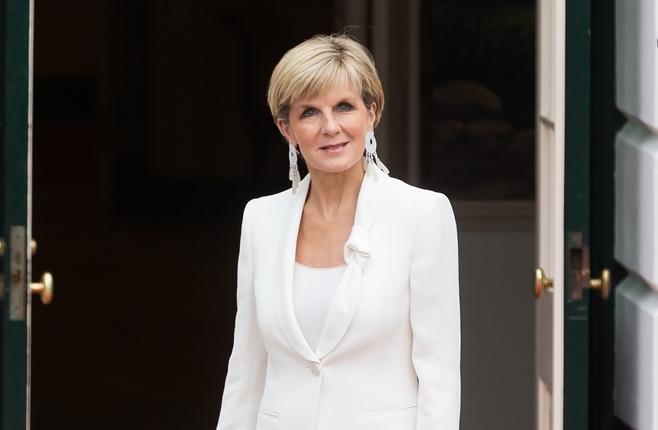
Julie Bishop - former Australian Foreign Minister
Julie Bishop described some of her “sliding door” moments as pivotal to her career.
Admittedly, those moments have helped her smash the glass ceiling on a number of occasions - from an early career in law to becoming Australia’s first female foreign minister and the first female deputy leader of the Liberal Party in its 75-year history.
“I think life is a series of sliding doors moments,” Bishop told a crowd of 950 at a Business Chicks luncheon in Sydney last week.
“Those decisions that you make, or the events that occur, alter your destiny, change your journey, your path in life. Sliding doors moments can shape and define who you are.”
As guest speaker of the event, Bishop shared some of her early observations, career experiences and lessons learned.
With a career in politics over the last 20 years - and prior to that a legal career spanning the same amount of time - Bishop said her education about globalisation and geopolitical events started early.
“I knew from a very early age that what happened around the world could impact on me, my family, my community.”
Growing up in the Adelaide Hills on the family’s cherry and apple orchard, she said international events affected her tiny world.
“It was a very tiny focused world, yet I knew that international events could have an impact,” she explained.
“I remember primary school evening dinner discussions as my father explained the Israel, Egypt Six-Day war. Pretty heavy stuff for a primary school kid, but our apple exports to England were on a container ship that got blockaded in the Suez Canal and that ship was there for eight years.
“The apples were not able to be sold, surprisingly, so by the time that blockade was over, England had moved into the European common market and so we no longer had that destination for our fruit and we had to look for new markets in Asia.”
Law partner at age 26
Meanwhile, some of her other “sliding door” moments happened in her early career once she graduated from law school and got a job at an establishment law firm.
“I was the first female to be employed as a lawyer in the long-history of this firm. I recall the first week like it was yesterday. Andrew, the other article clerk and I were invited to the partners drinks on Friday night. I am in my Liberty print dress with a large bow in my hair. Andrew was immediately swept up by the guys in the room and they were off talking golf.
“I hesitated for a little while, stood there, and then the senior partner of the firm came up to me and handed me the drinks tray. He knew I was a junior lawyer and he thought I could make myself useful.”
A few months later, she said this senior partner decided to leave the firm and set up his own practice.
“He was my sliding doors moment. As he was leaving, he dropped past my office and said, ‘Julie would you like to be my research lawyer. It’s a big risk. It’s a brand new firm. It’s a very controversial decision. People do not leave their articles halfway through.’
“And at that moment, I knew what I had to do and against all the advice, I left the firm, went to work for him. Within 18 months we’d built the firm into a larger firm. I became a partner of it at age 26 and I got my name in the title, Mangan Ey and Bishop. It is funny how things come full circle.”
A political calling
Fast forward to her journey into political life, which saw her first elected to government in 1998 as the MP for Curtin.
After relocating to Perth and working as a commercial litigation lawyer at Clayton Utz - where she eventually became the managing partner - she eventually took a sabbatical and went to Harvard Business School to do the Advanced Management Program.
“My favourite subject was government business and the international economy. The lecturer said, ‘One day you’re all going up the corporate ladder. You’re all going to be a success in business. But have any of you seriously considered going into politics and entering public office?’
“At that moment, I had a blinding insight: That is precisely what I should do. Not continue in law, not go into corporate Australia, but enter federal politics. The other Australians in the room laughed when I put my hand up.
“But I had actually been brought up to believe that entering public office was one of the highest callings and that if you have the opportunity to dedicate your efforts and your energy, and your abilities, to the betterment of your community, your state, your country, then that was a contribution worth making.
“So I came home to Australia and within two years of that fateful classroom discussion, I was elected as the member for Curtin and I took my seat at the House of Representatives in Canberra.”
After some time, Bishop said she has a secret ambition to become the foreign minister back in 1998.
“I say secret because in politics it’s a very career limiting move to let people know that you want their job," she says.
“I thought I’ll work really really hard and then they’ll notice that I’ll be a worthy successor to Alexander Downer, who was the foreign minister. I got myself elected to two government policy committees on foreign affairs and trade and I became the chair of the joint standing committee on international trade and treaties. Every Question Time, I put in a question on foreign policy. I wrote articles, opinion pieces, that were published in the Wall Street Journal and in The Australian.
“Five years later, John Howard called me into his office. He said, ‘Julie, I’m going to make you a Minister. The Minister for Ageing. I said Prime Minister, that’s insane. I can’t be the Minister for Ageing when I’m so against ageing," she joked.
"But it was a great gig. I learned so much. It was a very steep learning curve.”
She said she eventually went into Cabinet as the Minister for Education, Science and Training and Women’s Issues.
“Then we lost the 2007 Election. I became the deputy leader of the party and time goes on and in 2013, we get back into government and I became Australia’s first female foreign minister - 15 years after entering parliament.
“So the message is: never, ever give up on your dream because it just may well come true.”
Lessons learned
Bishop said she’s observed different leadership styles up close and personal - and shaped her style to be real and authentic.
“As foreign minister I witnessed up close the different leadership styles of men and women. And without generalising or trying to stereotype, men and women bring very different leadership styles. They have different experiences. A different perspective. Different insight.
“And those who specialise in this describe women's leadership style as transformational. Women focus on the needs of the individuals’ in their team. They nurture them. They are concerned for their interests and they build a better team by focusing on the individuals. By being more innovative, more collaborative. They look for consensus.
“Men are transactional. There’s the team. They hold the team to account. They are not interested, or as concerned, about the needs - the uncertainties, fears - of the individual. They build a team and hold that team to account. They are much more adversarial. They are much more competitive. Much less empathetic.
“And I’m not saying one is better than the other. What I’m saying is you need both leadership styles around decision making forums. The boardrooms, the cabinet rooms, the situation rooms, the security council. You need both styles there to get the best processes and the best outcomes. And we need to see more women, and we need to hear more women, in these decision making forums.
“No nation will reach its potential unless - and until - it fully engages with the skills and ideas and energy and attributes of the 50 per cent of its population that is female. And in Australia’s case that’s 51 per cent.”
Join the CIO Australia group on LinkedIn. The group is open to CIOs, IT Directors, COOs, CTOs and senior IT managers.
